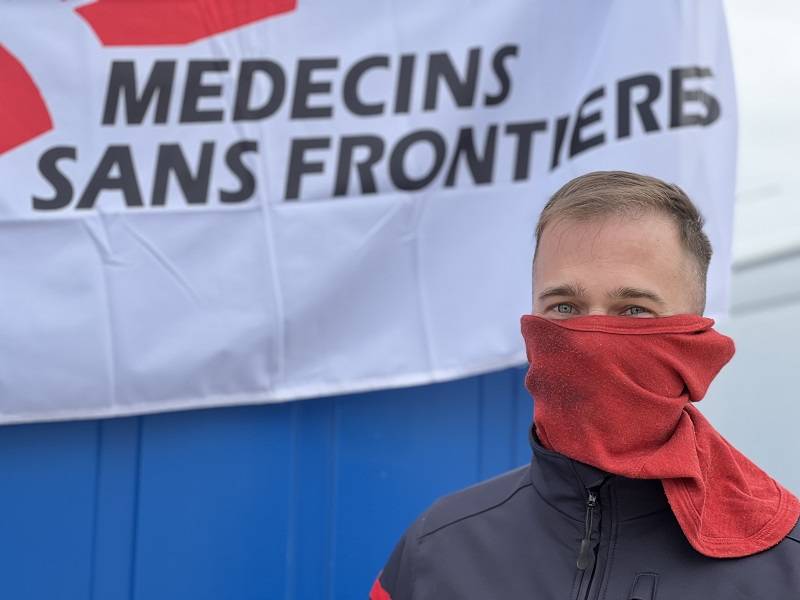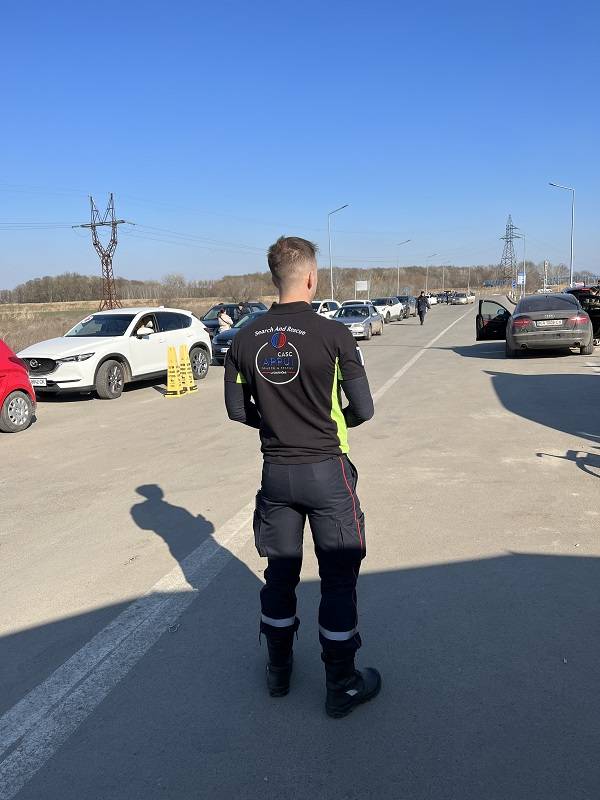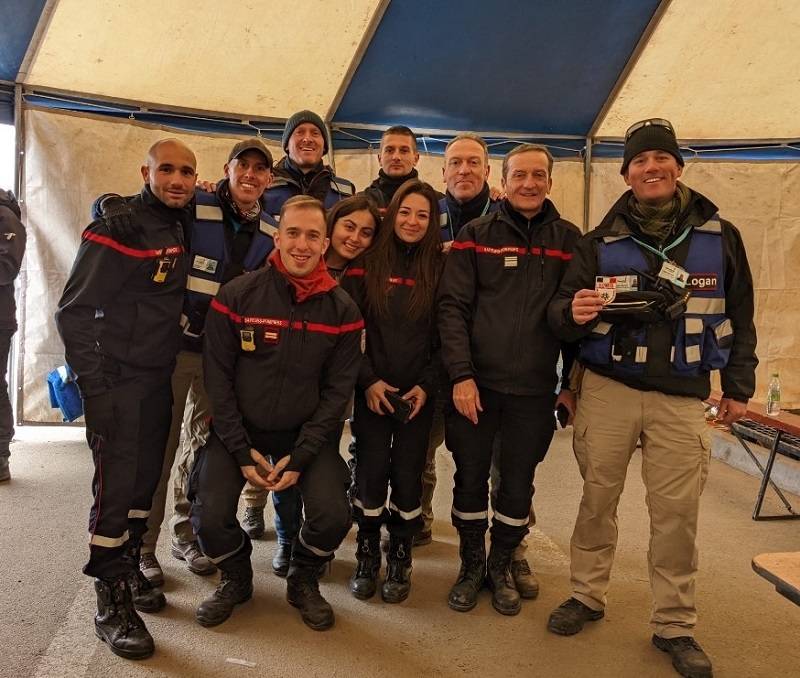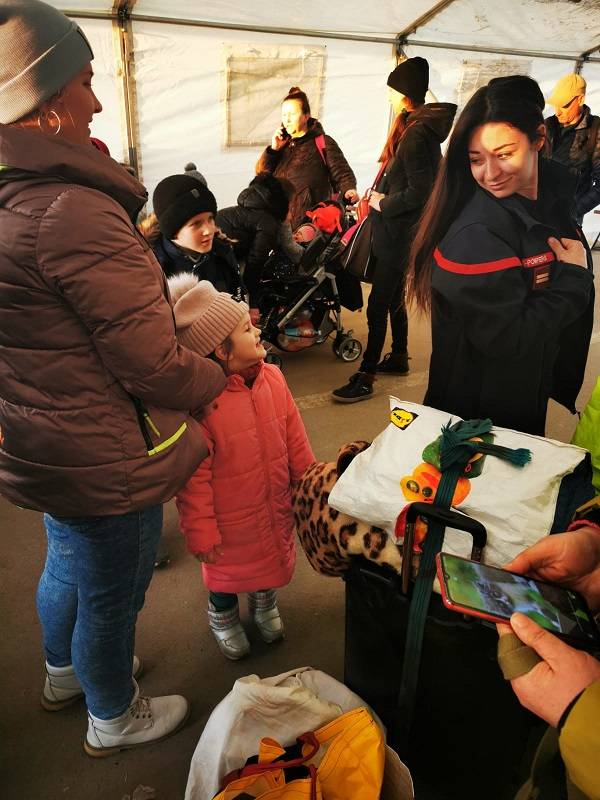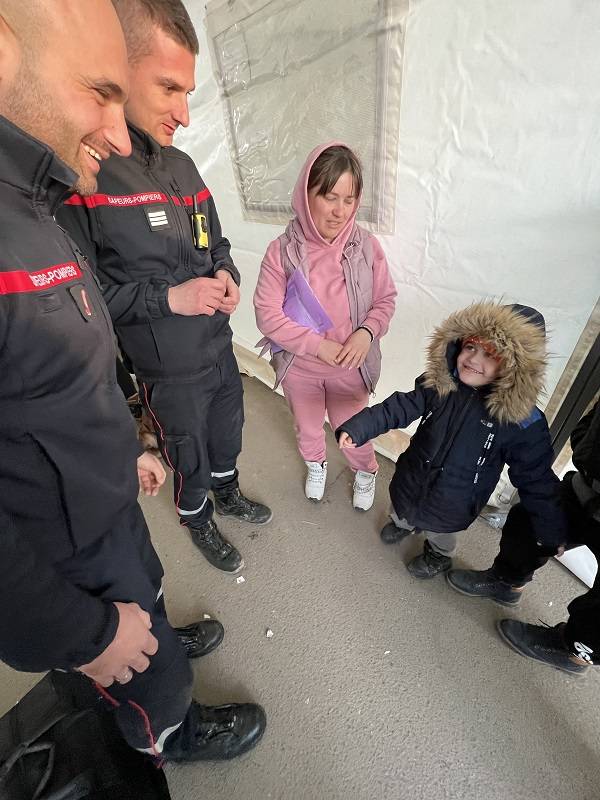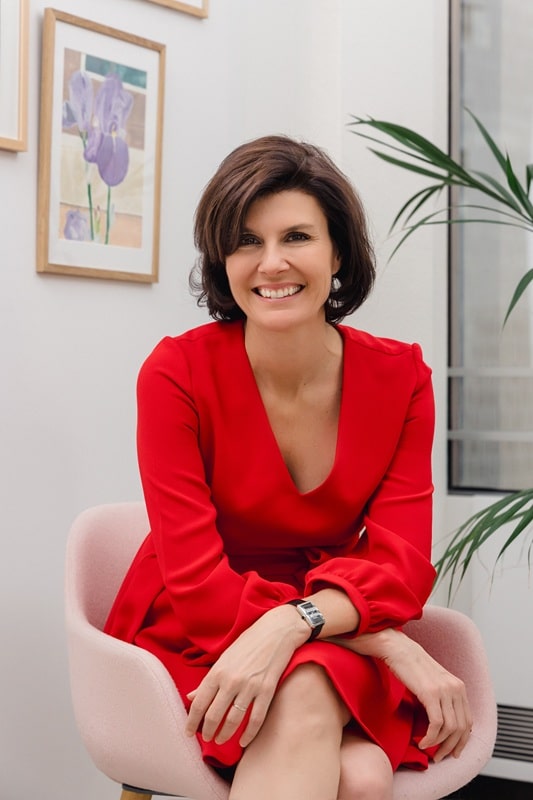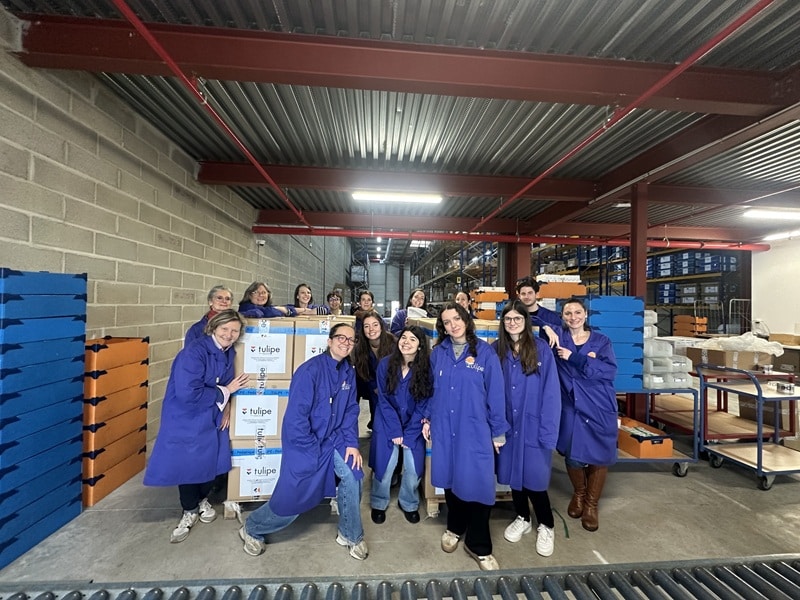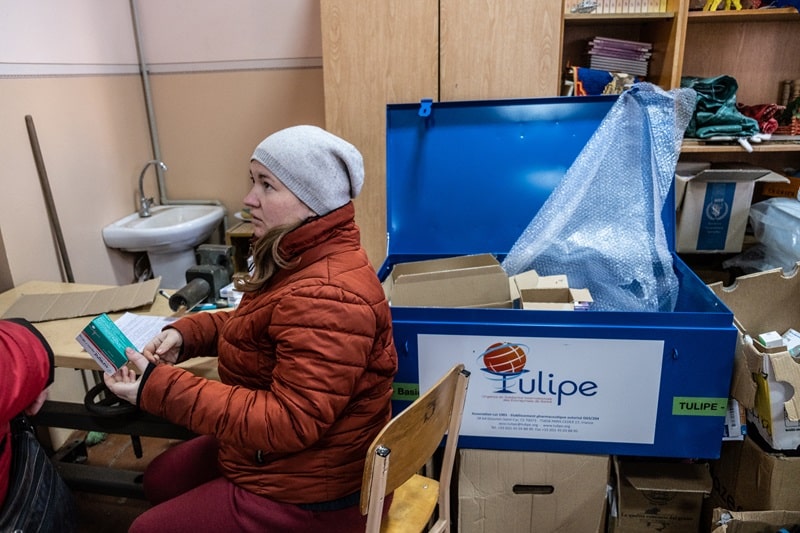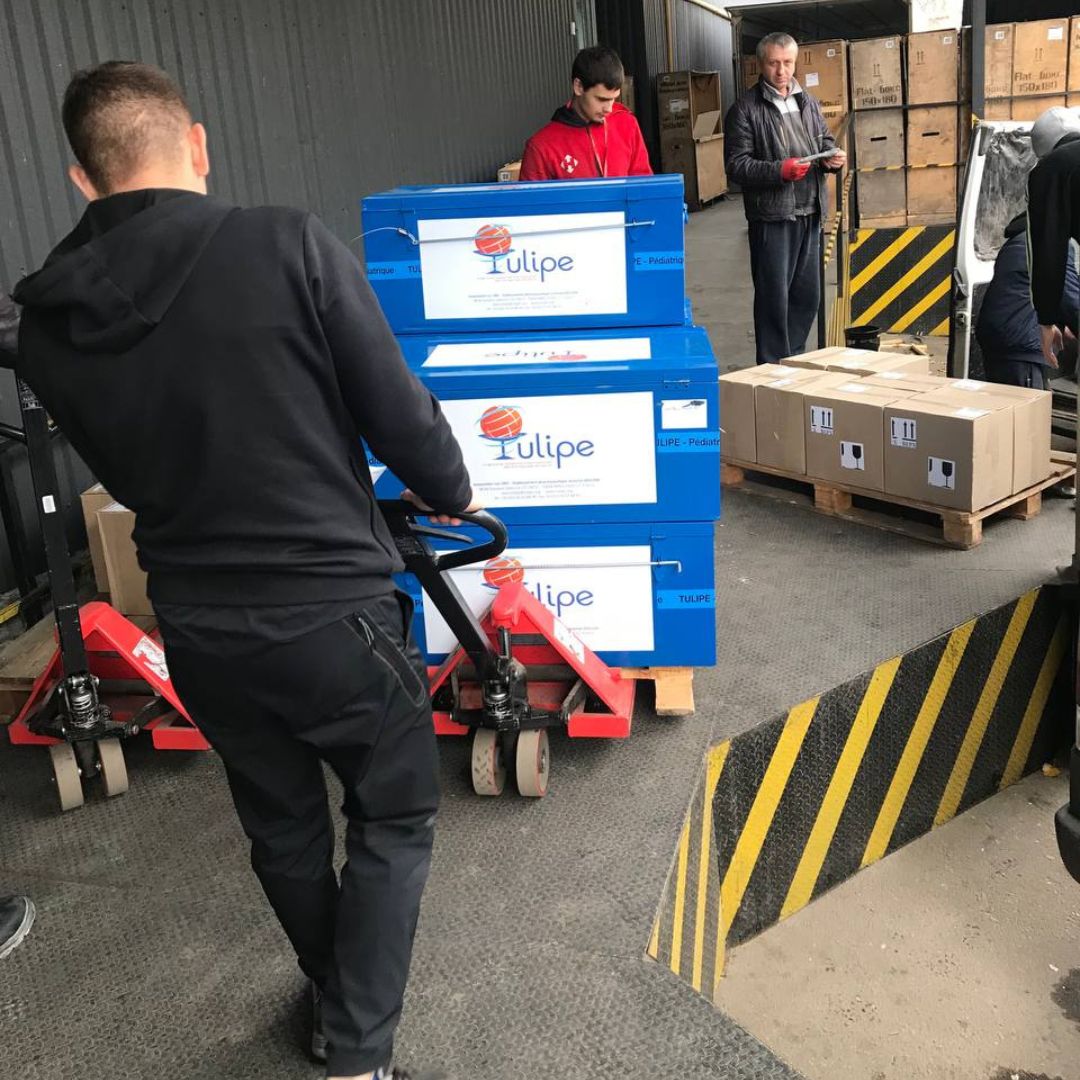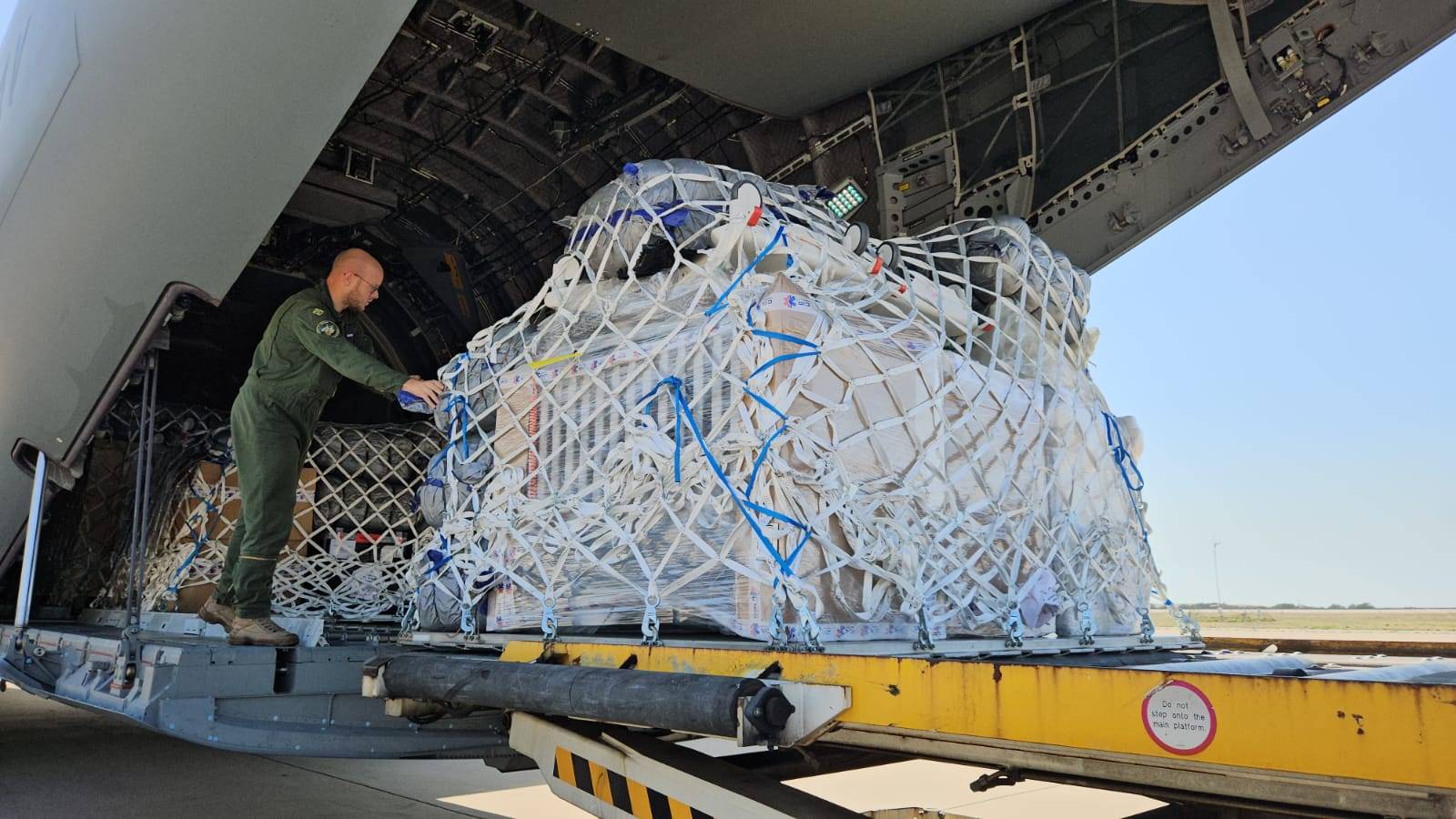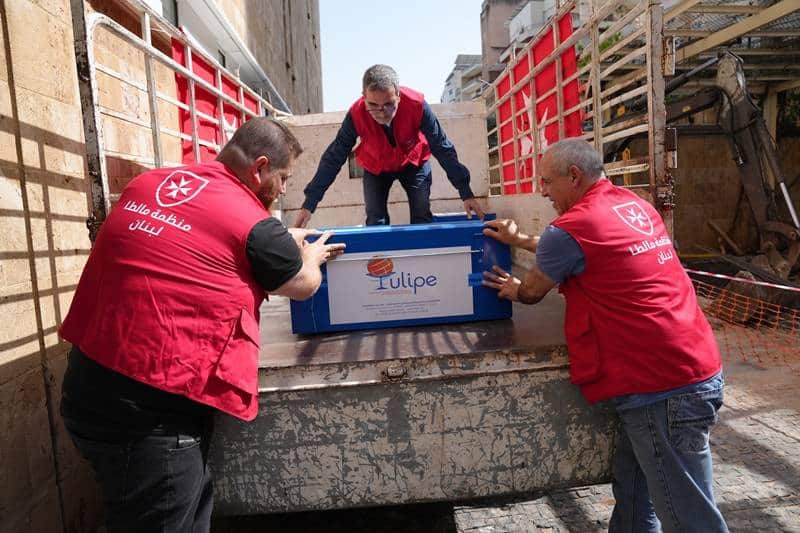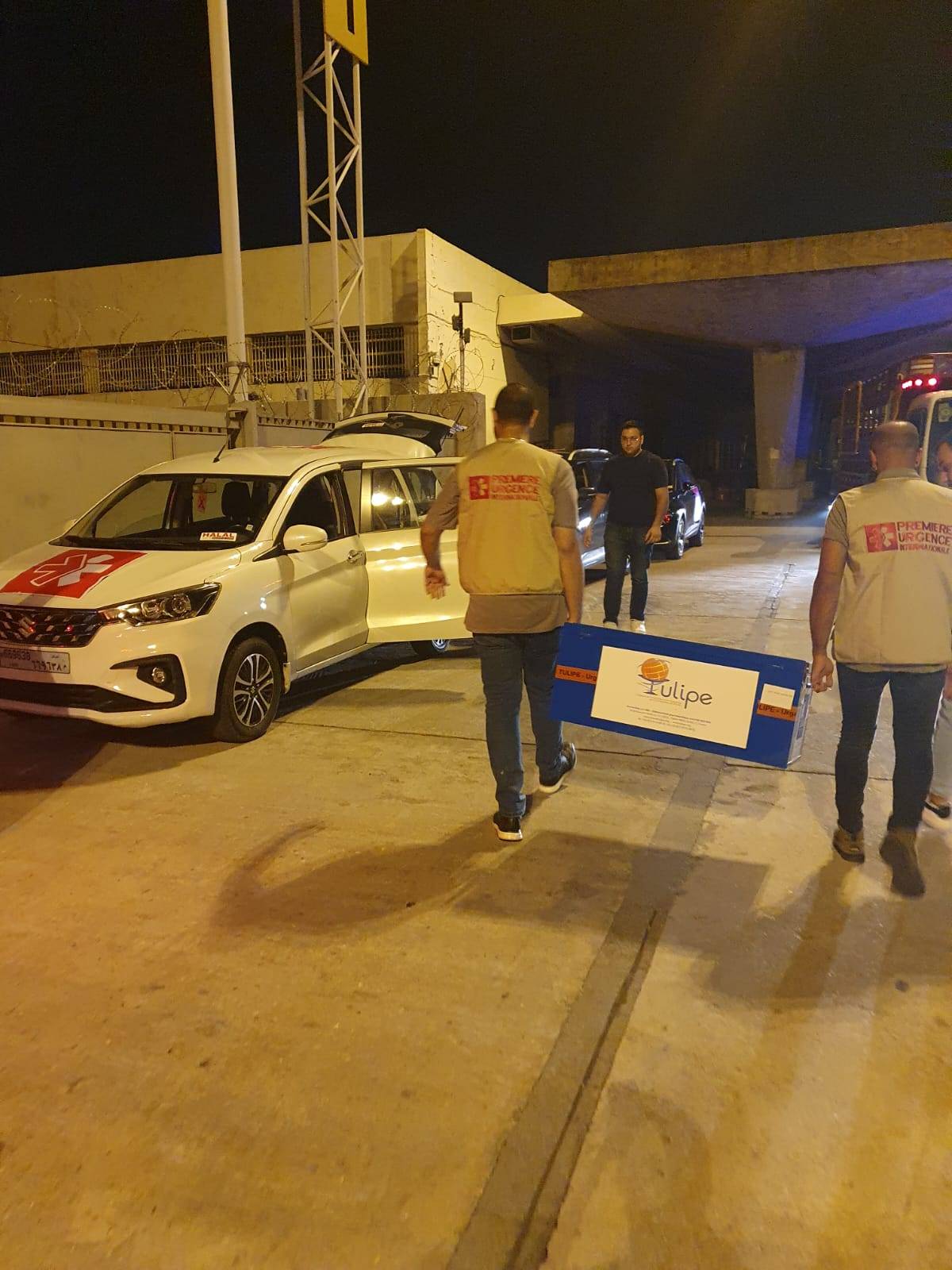[Portrait and interview] Parliamentary attaché, firefighter in three departments, doctor in practice in Grenoble and Valence, army reservist and semi-finalist in Ninja Warrior, the televised assault course: Antoine Reydellet, 33, is a young doctor with a strong commitment. An everyday hero, he is always looking for new challenges. Last March, Antoine left on a mission to Ukraine as a fireman with the CASC APPUI Search & Rescue team, transporting 18 trunks of Tulipe health products to the country. Here’s a look back at his journey and the twists and turns of his mission in Ukraine.
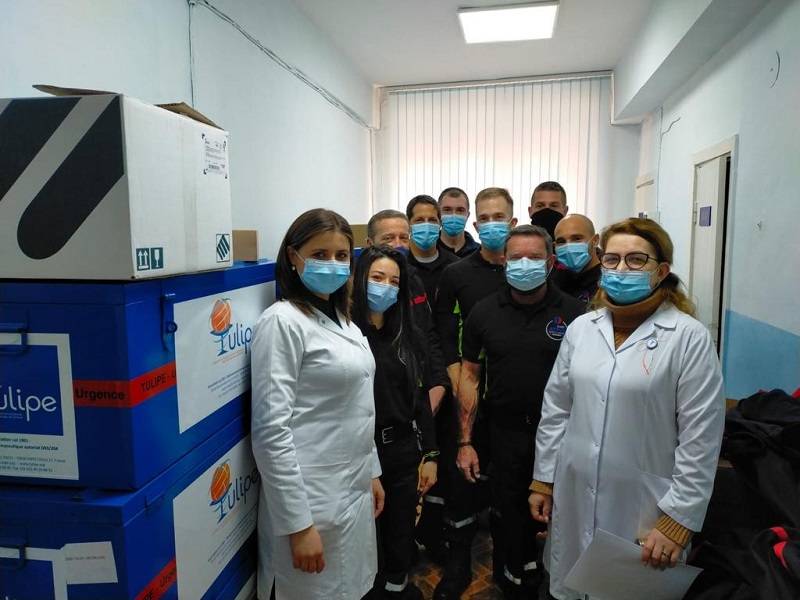
It took the CASC APPUI Search & Rescue team 33 hours of travelling to Europe and several incidents with Moldovan customs before it could deliver the Tulipe association’s health products. Antoine Reydellet is in the centre of the photo. DR
His career path is both impressive and atypical. After failing twice in his first year of medical school in France, Antoine Reydellet decided to go to Romania to study again. He took the “first step” in 2010, with an average grade of 14.92, so as not to have to repeat thethird year in France with an unfamiliar curriculum. 2010 marks the first common year of health studies (PACES), which replaces the first years of the first cycle of pharmacy studies and the first cycle of medical studies. Antoine then returned to France for his4th year as an Erasmus student, which enabled him to take a number of subjects ahead of schedule. After completing his5th and 6th years in France, in Lyon, and obtaining his medical degree, he decided to take his internship exam in the same city, choosing the speciality of occupational medicine. “The occupational medicine speciality is interesting because you never have the same type of consultation. Because you have all the jobs in the world, you discover new ones every day, from the stationery worker to the sports director”.
Union president, parliamentary attaché
During his first year as an intern, Antoine Reydellet became general secretary of the InterSyndicale Nationale des Internes (ISNI) for Lyon. He then became national general secretary of ISNI in his second year of residency. The following year, the young doctor became president of the ISNI (2018-2019), which enabled him to meet a large number of healthcare players and decision-makers across France. One of his hobbyhorses is the fight against medical desertification: “I was convinced during my term of office that the solutions to combat this desertification would not come from Paris, but from the regions. So I embarked on a tour of France to see what systems were in place and which ones were working, such as the fire brigade system in the Ardèche, which creates social links. After visiting around sixty départements, including Sarthe, where I met the MP Jean-Carles Grelier, I am now his parliamentary attaché”. Despite this position, he continues to work as a doctor, including as a firefighter. It was in this context that Antoine Reydellet left on a mission to Ukraine just a few days after the start of hostilities sparked off by the Russians.
Antoine Reydellet, fire doctor on a mission in Ukraine (March 2022). DR
Interview with Antoine Reydellet: “We were faced with a situation that we were unaware of in France”.
How did your departure for Ukraine go?
The Tulipe trunks were transported in the fire brigade’s first-aid vehicle. We left with CASC APPUI Search & Rescue, an association of firefighters from the Rhône, on Friday 11 March 2022 with two red ambulances and a logistics truck. It was a 33-hour drive from Lyon to the border between Moldova and Ukraine. We passed through northern Italy, Slovenia and then Hungary. We then crossed into Romania via Timisoara. Once through the country, we reached the Romanian-Moldovan border. We were confronted with a situation we weren’t aware of in France: there were a lot of pro-Russian Moldovan customs officers. The customs officers therefore blocked our entry into the country, as they had other humanitarian convoys. Some of them were carrying perishable goods. The blockade took place in the middle of the night, from Saturday to Sunday 13 March. Of the 9 people on board, I was the only one who spoke Romanian, as I had studied medicine there for three years and was one of the only students to be allowed in during my course. So I had to negotiate with the customs officers. They didn’t think anything of it. They ended up asking us for special authorisation from the Moldovan Ministry of Health to bring medicines into Moldova. This, even though we had explained to them that the medicines were for Ukrainians. After two hours of negotiating, I told my colonel who was there with us that I knew the Romanian town of Iaşi well, which was 20 km from the border post. So we found a hotel there so that we could rest after 30 hours without sleep.
Pro-Russian Moldovan customs officers blocked the fire brigade’s humanitarian convoy. DR
And then, how did you resolve the problem with customs at the border?
Once we were settled in the hotel, I started calling my contacts at the French National Assembly, in particular the MP Jean-Carles Grelier, for whom I am parliamentary attaché. We started contacting the embassies, bearing in mind that it was Sunday and not many people were available. At 11.30am-12pm, after a briefing, the French Embassy in Moldova told us that the matter should be resolved. We returned to the same border post as the day before. Once again, the border guards refused to let us through. We then learnt that a humanitarian corridor had been opened at another post 1? hours further south. We decided to go there. Once we arrived at the southern border crossing, our group found itself stuck between the Romanian and Moldovan crossings. It was even worse because we couldn’t turn back. Some of the drivers of perishable food trucks stuck in the same place explained to us that they had been stuck for two days. The guys in the team were getting fed up, so we started working on a plan to fall back to Constantza in Romania, where there was a humanitarian rear base in direct contact with Ukraine, with a French contingent stationed there. At 8pm, 10 hours later, Jean-Carles Grelier again insisted on contacting the French Embassy in Moldova and Romania, who were unable to break the deadlock. Finally, the Moldovan Health Minister called the customs office at the border crossing, which instantly unblocked the situation.
“Once they arrived, they were completely unstuck. Some moments were marked by scenes of extreme tension”.
The CASC APPUI Search & Rescue team was in contact with Ukrainian refugees crossing the border. DR
How did the mission go once they had crossed the border?
We crossed the border without any cargo checks. When we arrived in Moldova, we stopped off in Chișinău for the night. The initial mission was to deliver the medicines to Médecins sans Frontières, which was to dispatch them to hospitals. Once we found the NGO’s group post in Chișinău, they told us they weren’t expecting any medicines. This then turned into a headache because we didn’t know what to do with all those trunks. Going through Moldovan customs with them was out of the question. We then realised that there wasn’t much demand in Ukraine at the time, but there was on the Moldovan side because Ukraine, which used to manufacture the country’s medicines, no longer had the capacity to do so after the Russian invasion. The Tulip trunks were divided between Médecins sans Frontières and Moldova, in particular a state hospital in Chișinău. This type of hospital takes in the most modest patients in fairly rudimentary conditions. At the end of the mission, the remaining medicines were handed over to Médecins sans Frontières for Ukraine. Given the size of the donation, there were still quite a few left over.
The Ukrainian fathers accompanied their wives and children to the border before setting off in the opposite direction. DR
What contact did you have with the Ukrainian population?
We operate directly and have the authorisations given by Médecin sans Frontières to practise our profession as doctors. We visited Palanka, on the Ukrainian-Moldovan border, every day. The Ukrainian population arrived there by bus, in their own cars or on foot with the few belongings they had managed to bring with them in simple shopping bags. Often when the cars arrived at the border, it was the fathers of the families who left their wives and children and then set off in the other direction because they were not allowed to cross the border. The exchanges with the refugees were in English, while others spoke Romanian, which is when I was called in. We realised that there weren’t that many long-term illnesses. We mainly met people who were psychologically exhausted and who needed moral and psychological support. Sometimes we just helped them carry their bags. The future refugees had only one thing to do: cross the border. Once they arrived, they completely lost it. Certain moments were marked by scenes of extreme tension. This was the case when a man suspected of being a Russian spy was taken out of his car and started to be beaten up. We sewed him up. There was always something to do. The Ukrainians were very proud, they didn’t want to appear as refugees, a status that was difficult for them to accept.
French fire fighters in contact with refugees from Ukraine. DR
What impact did this mission have on you?
It wasn’t my first mission in a war zone, but what had an impact on me at the time was the fact that this war was taking place on our doorstep, practically on our own doorstep. The fact that civilians, and children in particular, were being affected. During my mission in March, the situation was unstable, with daily bombardments. Our safety was under direct threat. It was a very strange situation, with convoys carrying heavy weapons and tanks passing by every day… I wasn’t there as a soldier, but as a firefighter. So we didn’t have any bullet-proof waistcoats or weapons. We just had our medical equipment.
And after your return to France?
We made the return journey in one go, without stopping for a break because we were in such a hurry to get back. Those ten days were unbelievably intense for us. Once we got to Lyon, it took me a week to recover. It was very difficult for me to see children. I resumed my on-call duties as a fire brigade doctor two days after my return from the mission. One of my first interventions was when a gas cylinder exploded. The firefighters who arrived on the scene hadn’t had time to suit up, they were blasted by the explosion and the cylinder landed in the middle of a school playground. The emergency services asked me to go and I told them I didn’t want to look after children during the first week back.
Did you return to Ukraine after this mission?
I was offered to come back but I didn’t accept. One of the reasons was that here in France we lack resources, particularly doctors. In Lyon, there should be 8 fire brigade doctors, but there are only three of us, even though there are huge needs. Three months after the Ukraine, for example, I was called out to a terrible shooting incident north of Lyon involving four young people under the age of 20, two of whom died and two others were seriously injured. This is becoming the norm for people who live in these areas on a daily basis.
